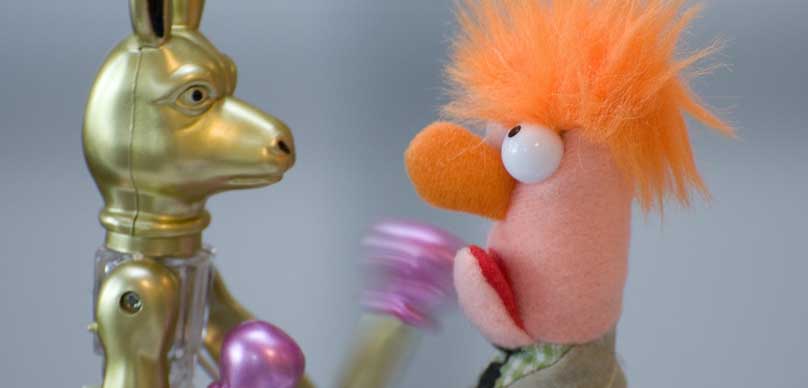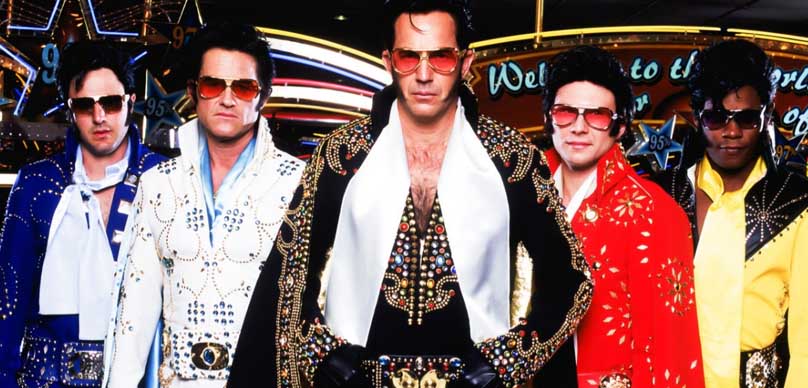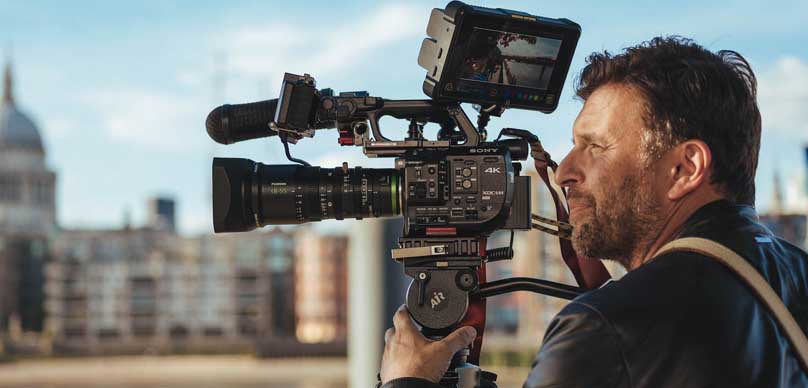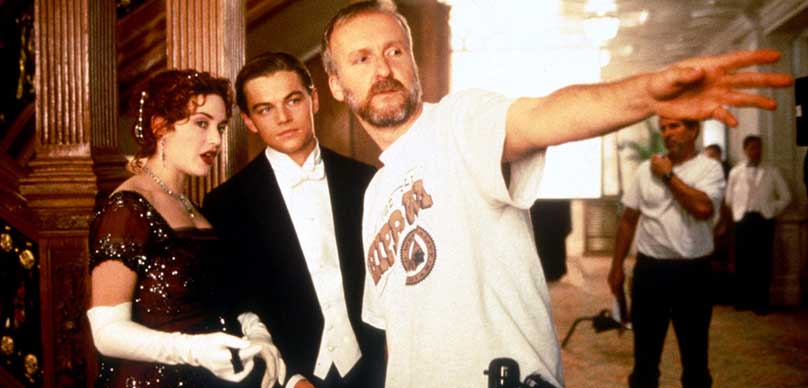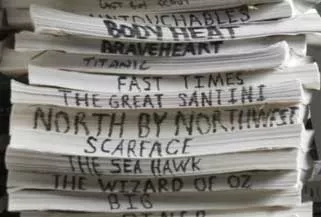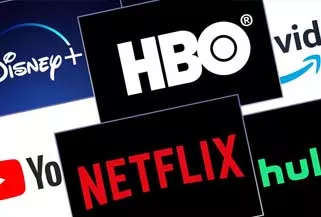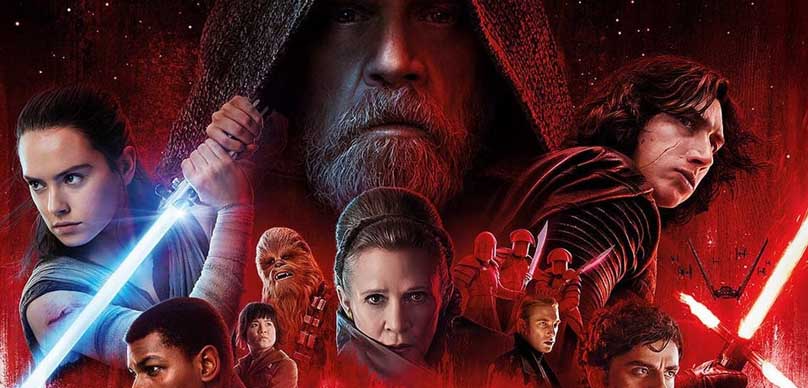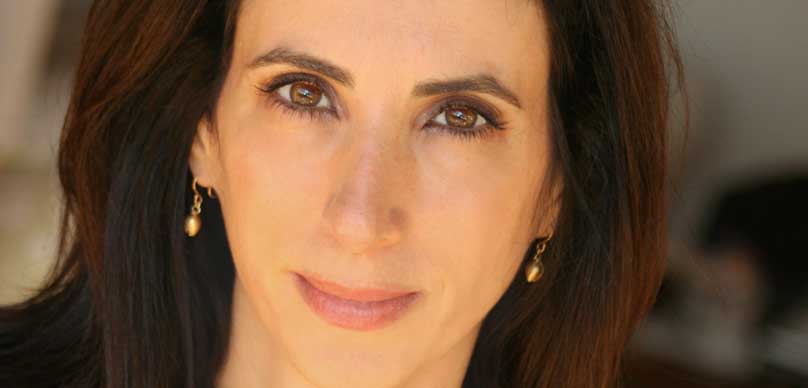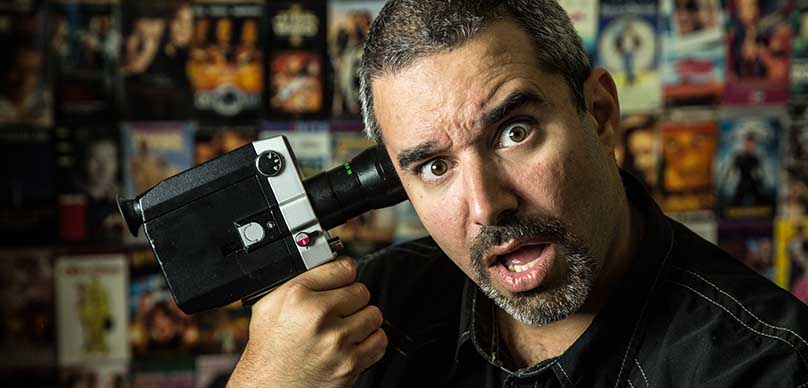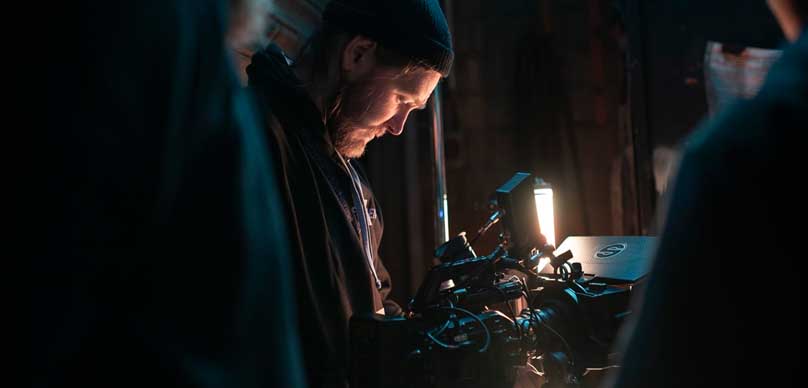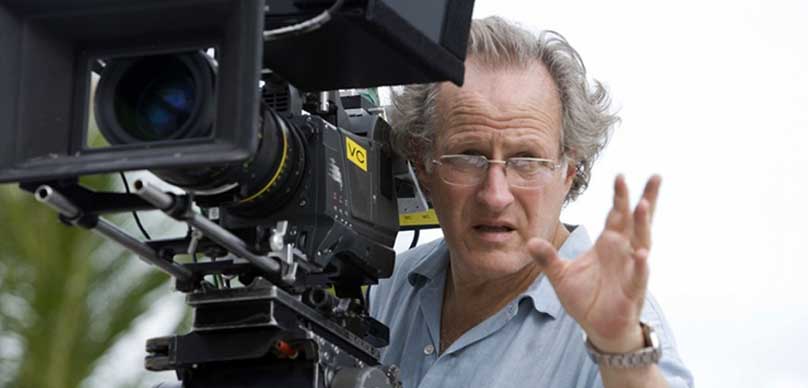Right-click here to download the MP3
One of the biggest issues filmmakers, screenwriters and creative types in general have is working with other people. Creativity is very personal to an artist, in any part of the process. I’ve seen first-hand decade-long friendships get destroyed by “creative differences”.
I could see the deterioration of relationships in my edit suite over the years; producers, directors, writers, cinematographers, etc. I personally lost friends along my filmmaking journey because of creative differences.
The biggest problem I see is that people need to set up a clear distribution of responsibilities for each person in the party. Create sandboxes and rules of play in those sandboxes. Miscommunication is death in any relationship.
In this episode, I go over a few techniques that have helped me work creatively with people. I can’t tell how sad it is when you lose a friendship over a project, I hope this episode can help you avoid this unneeded pain. We make movies. We tell stories. We provide entertainment to others. We should be able to build long-lasting creative relationships in this business.
Alex Ferrari 2:13
Now you guys might hear it in my voice. I have been sick, very sick over the last couple of weeks. It's been really rough holiday season for me and my family. My daughter's brought home this wonderful little bug, which then turned into another bug. And I am now on antibiotics. So my voice is a little bit more Barry White today. So enjoy it while it lasts. But that's why I've been a little slow with the podcast this week. But I'm here and I wanted to get you out one more fresh podcast before the year is out. And this episode is an episode that's very dear to my heart and one of my delusional fevers, I came up with the idea for this episode. Because it's so important and it's one of the more painful areas of of what we do. And it doesn't have to be, I'm going to go over specifically techniques that I've been using over the course of the last years to be able to work with people that you might not have a personal relationship with, and be able to work with them without having to kill each other. And then also how to work with people you have a personal relationship with and not kill each other. And I think the second one's a lot tougher to deal with and a lot tougher to work with because you have a lot of inside information on each other. And I'm going to tell you a story about you know how I lost a few friends along the way. And the differences between how I work now and how I used to work. Now let's start talking about the creative process in general. You know, we are creatives you know, we are people who have a lot of passion behind what we do whether we be directors, cinematographers screenwriters, any any area of production designers, you know, wardrobe, whatever we all have, we're very passionate about what we do. And sometimes, you know, people kind of cross into our sandbox. And that's where a lot of the problems start coming in. I think the biggest problem is miscommunication. And look, there's always going to be and before I get into it, look, there's always going to be acids, there's always going to be people who are going to try to manipulate and and do things and get their way and hurt try to hurt you. Or try to take you down because they want to move ahead. There's all sorts of different kind of political things. I'm talking about just a good honest relationship, which happens, believe it or not in this business. But you know, I'll tell you a story real quick. Once I was working with one of my best friends at the time, and we produced a movie together. I was a director, he was the producer on it, and I was a producer as well. And, you know, it was the first big thing that he'd ever done. And, and I'd been around the block a little bit at that point. But the one problem we had was he wanted a little bit more control of the vision of the The project, and I had been already a director for, you know, 810 years at that point. And he never stepped foot on a set prior to that, and, and he wanted more control over it. And he really didn't understand how the game was played. And it was my fault for not really educating them and setting up boundaries at the beginning. And that was the very beginning of the downfall the project is, while we were on the project, and, you know, actually shooting it was great, you know, we, we both stuck to our own sandboxes. And, you know, he did his job, I did my job. And we were able to get out, you know, with a great product, a great product, the problems were in pre production and post production. And then farther along afterwards. And it was unfortunate, because it took about another year, year and a half after that project was released, that our friendship started deteriorating to a point working there and never was able to recover. And it was very sad, I wish it wouldn't have happened. And a couple things I learned along the way of what I could have done to help that situation along so it wouldn't have happened was one clearly define what our jobs are, clearly define what we were going to do in the project. So there is no miscommunication. So you're like, I'm the director, I'm responsible for this, this, this and this, you're the producer, you're responsible for this, this, this and this, we can, you know, meet here somewhere in the middle, if you want have creative ideas, great. But the end of the day, I have the final say I have the final cut, and so on and so forth. So having a very frank and honest conversation with your collaborator, especially once if it's going to be between a director and a producer, is going to be invaluable to you moving forward. Because if there is that miscommunication where the producer thinks he has more power, or the or the director feels that he or she has more power in his sandbox, whether on the more on the production side of stuff, or there's more the writer has more feels it has more control more authorship over the project than the director, these are problems that will fester. And if they do not be if they're not taken care of right away, they will fester, they will blow up. And the bigger the bigger the guys and girls that you're working with, the bigger these fights can turn into and you've seen it. You've seen it, you know with Josh tank in fantastic for you just recently saw it with the solo movie, then the new Star Wars movie that they fired the two directors because of creative differences. And it was obviously a miscommunication. Because those directors came in thinking that they wanted their flavor of stuff. And Disney or Lucas Films like wait a minute, wait, we can't make it this funny. And all of a sudden, they're like, Well, you know, why did you hire these guys then? And there was a miscommunication. And that was just lack of communication, on really laying down what was going to happen. It was a failure on both parts, in my opinion. So laying out what your job titles are, is, is one, two, asking the person you're collaborating with what the what outcome do they want for this project? is such an important question to ask. So if you're a director, and you're hiring a producer, or working with a producer on a project, and you both are, you know, 5050 partners on it, and you know, you want to get it out there the question you have to ask like, Okay, what do you What's your outcome for this movie? What do you want to do with this movie? Is it a money grab? Is it to get your name out there? Do you care about making money with it? Is it only about money? What what's the point of this? Is it about getting the message out there? What is the point of this endeavor? And if you guys are have two different answers, this is a problem. Because if you want to get it out there just to promote yourself as a director, you really don't care if it makes money. But the producer is like no, no, no, no, we have to we have $150,000 here that we've borrowed, and we got to make our money back on this. And so it's about the money. That's why we have to cast this person. And all of a sudden, the two, the two point of views, the two end points of the project are completely different that project is and is going to fail, it will fail because the team is not coherent. It's not they're not together on their end goal on their end vision. So you really have to understand where each of you are coming from, you know, and, again, for screenwriters for I'm talking about producers and directors with screenwriters are the same thing. You have to talk to your screenwriter. What's your goal with this? Do you just want to get paid out? Do you want to get your name on IMDB? Do you want to get a movie produced? What is your end goal on this? answering these questions will prevent so so many problems. I can't even explain to you. And not only from my own personal experience that I've gone through a lot of this kind of hardship working with with other people sometimes. I've seen it in my edit room. I've seen relationships deteriorate in front of my eyes in editing and And you know, the final stages of deliverables, because I just see what happens. I hear all the stories about what happened, and what's going on and the drama. And, you know, why is this movie have 20 Executive Producers on it, I'm not even joking, I did a movie that 20 Executive Producers on it with 20 different points of view, not to mention the director, the stars, the main producers, the distributors, it was Miss she just could, I can't even explain to you how crazy it was. But understanding that when you're working on these little indie movies, you really have to have a very clear vision of where you want the movie to go, and what the outcome is that you're going for. Because if it's not on the same page, you guys will fail. And this is where relationships start get deteriorating. And when you're working with people that you you know, your friends, you know, I worked at a project once with a dp friend of mine. And he, you know, was friendly, friendly, friendly, friendly. We'd known each other for a few years, he was coming on board doing me a few a bunch of solids. And boy, I tell you, when I got on set, he was a complete ass. He was showboating for other people on the crew, he did not have my back, I had to kind of save it in color. Because I didn't feel that he did the greatest job he could in the project. And, and overall, I learned a big lesson that day, I was like, wow, not that day, that project, you know, and that was the end, that was the beginning of the end of that relationship, because of the way he treated me. And where I was in a very tough situation. He didn't have my back. And that was, again, a miscommunication. He had very different goals than helping me make my movie, he wanted something cool for his demo reel. And that was very evident, with the way he shot it. And his attitude towards me, he didn't care at all about my movie getting made, or that I had put up a lot of money to make it. But unfortunately, it was. So these are these are hardships, these are things that they will not teach you in film, school. These are things that a lot of people don't like to talk about. But it is the honest truth. And we hear about it every day, we hear about creative blow ups every day. And those two main questions, I think are what can solve a lot of pain and suffering from this process, you have to set up clear goals for what the movie where the project that you're working on, is going to be, and that everybody is on the same page, on how to sell it, how it's going to be distributed, what the end goal as far as money is concerned, how you're going to market it in every other aspect of the production and making of the movie, you have to understand what those goals are. And secondly, you have to set up very clear divisions of labor on a professional set. This is not a problem, you know, the director is a director, you know, the DP is the DP, the producers, the producer, the production designer, the production center, and so on. But on indie movies, a lot of times, you're not dealing with very seasoned professionals, you're not dealing with guys who've been doing this, or girls have been doing this for 20 years, you're gonna be dealing with new people. And that's where the problem lies. So you've got to be very clear as leaders in your project, whether you're the producer, the director, or both, you really got to lay down the long go, this is what you're responsible for, and you've got to do it. Sure. Sometimes, sometimes things will overlap. You know, like when I work with a dp, there's directors who work with DPS in a way that they're like, I don't even want to know what the lens is. I don't even want to know what what the camera is just show me the picture when it's done. And that's all I care about. Unfortunately, I'm not that kind of director. I'm a director who can speak the same language as a dp because I've shot myself, I'm very tech heavy, since I'm doing the posts on top of them in regards to things. So I'm much more, I cross into the DP sandbox a lot more when I work with a cinematographer. And we collaborate a lot more, you know, so it all depends on what kind of director and DP you are. But then you got to make sure you find a collaborator who's willing to do that. There's other DPS with like, get out of my sandbox, I'm like, Well, no, we can't work together. Because that's not the way I work. So you have to have these conversations beforehand. Because if you don't imagine getting on set, and you want a little bit more control over the light, or you know the lights or camera or lenses, and the DP is like, you know, get out of my head, my, my, my side kid, I'm going to do whatever I'm going to do, and that's the end of it. That happened to Steven Spielberg. When he first started out, he was dealing with a lot of these big, so old, salty DPS. And he was really trying to get into it and they wouldn't even talk to them. You know, especially, you know, working on, you know, on television in this in the 70s. It's so it happens. It definitely happens but have these conversations if you have the sense of power and a sense of power. But if you have the power, and in these indie projects, you should be very clear about what those divisions of labor are. And if you can answer those two main questions, a lot of these painful situations can be eliminated from your filmmaking journey. So I hope this episode helped you out a little bit, guys, it was something that was a short one. But it's something I really wanted to get off my chest and wanted to see if I can help you guys out a little bit as well, because I know, I know somebody listening right now is going through this as we speak, or has gone through it recently. Or we'll go through it in the near future. So I hope it helps you guys out. Now, I want to I want to give a shout, I want to give a call out to anybody in the indie film, hustle tribe, I'm going to be going to Sundance this year, coming up in a few weeks, and I am looking for a sound person, I'm looking for a sound person, preferably if they live here in LA, which would be great. And we're going to be able to fly you out to to LA to hang out with me and the tribe, you know, the our crew and everything, we're going to be shooting a bunch of interviews out there for indie film hustle. And we're looking for a professional sound person that can come out and help us out for like four or five days. So if you guys are interested in anybody out there, you know, fits that bill, please email me at [email protected]. Send me your resume, send me links to your website, your IMDb and everything like that. Preferably, if you have some feature experience, interview experience as well, that'd be great. But again, just email me at [email protected]. And I hope to have a tribe member with me at Sundance this year, helping us out. So I want to try to have as many of you guys there as possible. And we're going to be there from January 18 to the 23rd. But am I mistaken. And you know, if you guys are going to be out of Sundance, hit me up, see if we can hook up and see if we can get a little get together of the tribe and get some drinks. And you know, there's gonna be a party on Saturday night that we throw every year that would be a great party. If you're in the area, you're more than welcome to come on in and say hi, it's a insane party that we throw on Main Street every year. So just email me at [email protected]. And this is going to be the last episode of a new fresh episode of for the year of 2017, which has been an amazing year for me. And for the tribe. I know I've heard so many great things about what you guys have been doing so, so happy that indie film hustle has been able to help you guys along your path and journey. Tomorrow, we're gonna release a throwback Friday. And then Monday, we have an epic New Year's Day episode, which I'm going to be recording tomorrow. And the surprise guest is a big, big, big deal in the world of getting you up off of your ass to go do something. So I cannot wait to share that news with you as well. And don't forget Monday, New Year's Day starts the Ask Alex show on YouTube. Every day, I'm going to be releasing a new episode of the Ask Alex show. And that will be for 31 days where I'm doing a consulting session with members of the tribe. And so we'll be going a question a day. Sometimes the questions are two minutes sometimes or 10. All depends on the situation. So it's a lot of great information. I had a ball doing it. If it's something that you guys want to see more and more of, let me know. I'll know by how many likes I get on YouTube. I'll know by how many views I get on YouTube, if you like it, share it, get it out there, but it's gonna be at indiefilmhustle.com/YouTube, it'll go right to the channel. And I got all sorts of other crazy stuff coming up for the new year as well, guys. So thanks again for an amazing 2017 the growth of indie film hustle has been amazing. And I'm so happy that we're reaching more and more people around the world. So thanks again. As always, I am humbled. Always humbled to serve you guys on your filmmaking journey. As always, keep that hustle going. Keep that dream alive. And I'll talk to you soon.
Sign up to receive email updates
Enter your name and email address below and I'll send you periodic updates about the podcast.
YOUTUBE VIDEO
LINKS
- [easyazon_link identifier=”B01LVW5HPV” locale=”US” tag=”whatisbroke-20″]BROKEN[/easyazon_link]
SPONSORS
- Bulletproof Script Coverage – Get Your Screenplay Read by Hollywood Professionals
- Audible – Get a Free Filmmaking or Screenwriting Audiobook
- Rev.com – $1.25 Closed Captions for Indie Filmmakers – Rev ($10 Off Your First Order)

